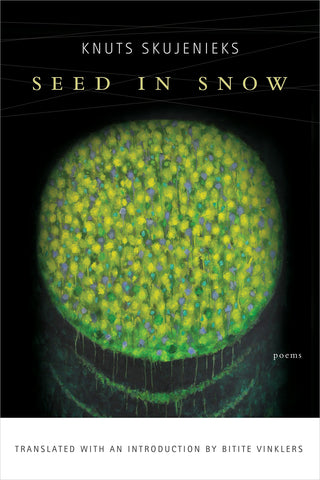
About This Title
This first US publication of Knuts Skujenieks—one of Latvia’s foremost contemporary poets—is the author’s most important and widely-translated body of work. Convicted in 1962 of anti-Soviet sentiment, Skujenieks wrote these poems during seven years of imprisonment at a labor camp in Mordovia. Presented bilingually in English and Latvian, this vivid and expressive collection overcomes the physical experience of confinement in order to assert a limitless creative freedom.
“To a Dandelion Blooming in November”
If you know you must bloom
Don’t ask if the time has come
Don’t ask if the time has gone
If you know you must bloom
Heed the voice coursing in you
When sap disturbs your roots
When your greenness torments you
Heed the voice coursing in you
Lift up your yellow crown
Muddle plans and calendars
Muddle rules, muddle minds
Lift up your yellow crown
With you, we feel we are home
You bloomed unasked
You bloomed unasking
With you, we feel we are home
Praise for Seed in Snow
“Skujenieks makes his own emotions so gigantic that even the trees and the sun itself share them. The pines themselves want to escape, the sun is saddened, and yet, because the landscape shares in the prisoners’ suffering, that suffering is made bearable. . . . Nature, fierce and simple, is always interwoven with emotions in these poems. . . . Skujenieks’ strength is his ability to universalize his experience. . . . The poems in Seed in Snow can use this sort of shared experience to transport the reader into a far-off reality most of us will never experience.”—Words Without Borders
“Although Skujenieks’s poetry has been translated into more than thirty languages, this is the first collection in English. The selection is centered on the years [he was imprisoned] in Mordovia. The poems are highly diverse in style, tone, and motif, but throughout, despite a sometimes dark worldview, an irrepressible spirit keeps breaking through. He shows emotion and man’s engagement with others and with the world around him in voices other than his own, both human and taken from nature: voices as varied as that of the biblical Jacob, the poet Vallejo, a road, and a snowflake. He creates a sense of universality by conflating eras and events.”—Bitite Vinklers, from the Introduction
Publication Date: November 15, 2016
ISBN: 978-1-942683-22-3
© BOA Editions, Ltd. 2016

